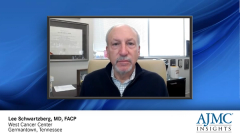
Coverage for Chemotherapy-Induced Neutropenia
The impact of the COVID-19 pandemic on oncology practices, especially those operating under the Oncology Care Model, regarding the management of chemotherapy-induced neutropenia, and reactions by payers.
Episodes in this series

John Fox, MD, MHA: Earlier this year, the NCCN [National Comprehensive Cancer Network] made changes to its recommendations for CIN [chemotherapy-induced neutropenia] prophylaxis because of the COVID-19 [coronavirus disease 2019] crisis. There were several recommendations. First of all, they recommended expanding the use of colony-stimulating factors in CIN prophylaxis for patients who are at intermediate risk, 10% to 20% risk of febrile neutropenia.
They also recommended that the use of colony-stimulating factors be expanded in the therapeutic arena. Not only for patients who are at high risk for complications but for any patient who developed febrile neutropenia, with a primary goal of reducing the risk and the length of hospitalization. The question is, how have payers promoted this? I would guess that most payers aren’t familiar with this as a recommendation unless they’ve gotten a lot of requests for expanded utilization, and they’ve gotten explanations from providers about the NCCN’s recommendation. I did a cursory review of all the major payers and their prior authorization policies for colony-stimulating factors and found that nobody had updated their policies. As I’ve noted, some payers already covered patients who are at intermediate risk, but it doesn’t appear that any payers have expanded their coverage in the 3 or 4 short months since the NCCN made its changes. That doesn’t mean payers aren’t covering it; they just haven’t changed their policies. I would say that for the most part, because most patients are already getting these therapies at home, the biggest expansion is those lower-risk patients. And again, those patients may get coverage on an individual review.
The COVID-19 pandemic has had a dramatic impact on some oncology practices. The practices have remained open and patients have continued to receive treatment, but the number of new patients identified fell significantly early on during the pandemic because fewer patients were gettingscreening mammography, screening colonoscopy, low-dose CT for lung cancer and the like. Those volumes have picked up since June, July when patients started to receive those screening tests again.
Practices participating in the CMMI [Centers for Medicare & Medicaid Innovation Center] Oncology Care Model have been affected equally, like those who aren’t participating in OCM. But interestingly, the expansion of the NCCN guidelines to include a broader range of patients for CIN prophylaxis presents some interesting challenges. This would increase the cost of care for those patients. And so how does that impact practices in OCM? Notably, because of the pandemic, practices in OCM can drop upside and downside risk during the performance periods affected by the COVID-19 pandemic, which would be performance periods 8 and 9 so far, and hopefully not 10 and 1, which should be in the calendar year 2021. But CMS has also made a commitment to allow practices that opt to stay in 1- or 2-sided risk for these affected performance periods to remove COVID-19 impacted episodes of care from reconciliation in those periods. The good news is that there doesn’t appear to be any adverse effects of practices who choose to expand their use of prophylaxis against CIN or febrile neutropenia during this period. So it’s good news for practices that they can expand coverage and use of prophylaxis without any adverse consequences.
Newsletter
Stay ahead of policy, cost, and value—subscribe to AJMC for expert insights at the intersection of clinical care and health economics.






